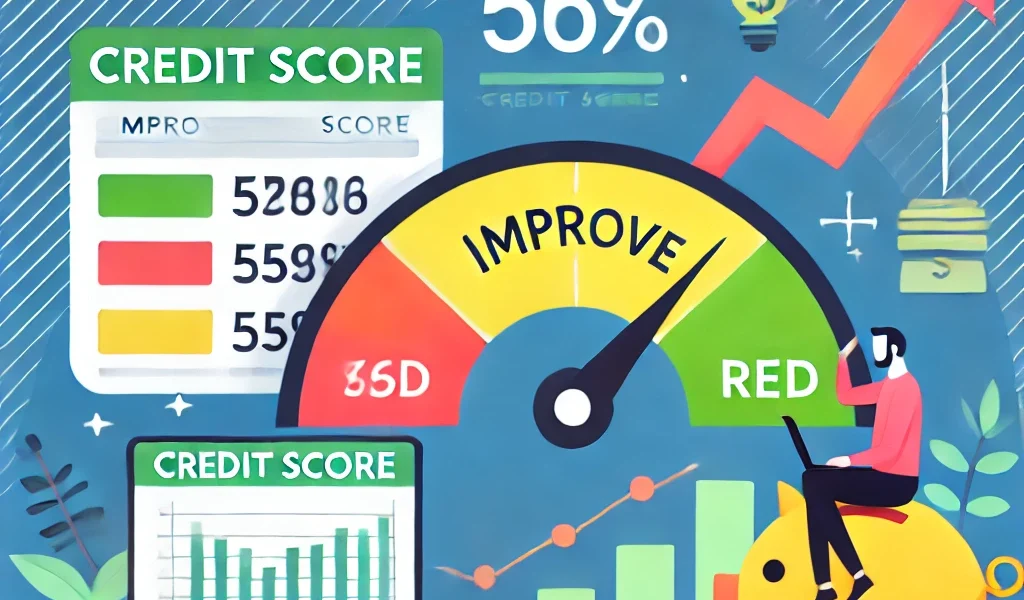A good credit score is essential for financial stability and access to credit opportunities. Whether you’re applying for a loan, credit card, or even renting an apartment, your credit score plays a vital role in determining your financial credibility. If your credit score is less than ideal, don’t worry—there are effective ways to improve it over time. In this guide, we’ll discuss why credit scores matter, how they are calculated, and practical steps to enhance your score.
Why Your Credit Score Matters
Your credit score affects multiple aspects of your financial life, including:
- Loan Approval – Lenders use your credit score to assess your creditworthiness. A high score increases the chances of loan approval.
- Interest Rates – Borrowers with higher credit scores receive lower interest rates on loans and credit cards, saving money over time.
- Credit Card Eligibility – Premium credit cards with better rewards and benefits require a strong credit score.
- Rental Approvals – Landlords may check your credit score before approving a rental application.
- Employment Opportunities – Some employers review credit reports as part of the hiring process, especially for finance-related roles.
- Insurance Premiums – A good credit score can lead to lower insurance premiums on auto and home insurance.
How Credit Scores Are Calculated
Understanding the factors that contribute to your credit score can help you improve it more effectively. The major components include:
- Payment History (35%) – Timely payments on loans and credit cards impact your score the most.
- Credit Utilization (30%) – The ratio of your used credit to your total credit limit. Keeping utilization below 30% is ideal.
- Length of Credit History (15%) – Older credit accounts contribute positively to your score.
- Credit Mix (10%) – A diverse mix of credit types (credit cards, auto loans, mortgages) helps improve the score.
- New Credit Inquiries (10%) – Too many recent credit applications can temporarily lower your score.
Effective Strategies to Improve Your Credit Score
1. Pay Bills on Time
- Set up automatic payments or reminders to avoid late payments.
- Even one missed payment can negatively impact your score.
2. Lower Your Credit Utilization Ratio
- Keep credit utilization below 30% of your total limit.
- Request a credit limit increase but avoid spending more.
- Pay down existing balances regularly.
3. Check Your Credit Report Regularly
- Obtain free credit reports from major bureaus (Experian, Equifax, TransUnion).
- Dispute any errors or inaccuracies that could be hurting your score.
4. Avoid Opening Too Many New Accounts
- Every hard inquiry can lower your score slightly.
- Apply for new credit only when necessary.
5. Maintain Old Credit Accounts
- Closing old accounts reduces your credit history length and available credit.
- Keep old accounts open, even if not in use, to maintain credit history.
6. Diversify Your Credit Mix
- A mix of revolving credit (credit cards) and installment loans (mortgages, auto loans) is beneficial.
- Avoid taking unnecessary loans just to improve the mix.
7. Negotiate with Creditors
- If you’ve missed payments, request a goodwill adjustment from creditors.
- Settle outstanding debts strategically to avoid negative reports.
8. Become an Authorized User
- If a family member has a good credit history, being added as an authorized user can improve your score.
9. Use a Secured Credit Card
- For those with a low or no credit score, secured credit cards help build credit with responsible use.
10. Practice Responsible Financial Habits
- Avoid overspending and take on debt only when necessary.
- Create a budget to manage finances effectively.
How Long Does It Take to Improve a Credit Score?
Improving your credit score is a gradual process. Depending on your starting point and financial habits:
- Minor improvements (e.g., reducing utilization) can show results in 1-3 months.
- Correcting late payments or errors can take 6-12 months.
- Rebuilding a poor score may take several years with consistent positive behavior.
Final Thoughts
Your credit score is a crucial factor in achieving financial stability and accessing better financial opportunities. By understanding how it works and applying responsible credit habits, you can steadily improve your score and enjoy the benefits of lower interest rates, higher loan approvals, and better financial security. Start making small, smart changes today to build a stronger credit profile for the future.


